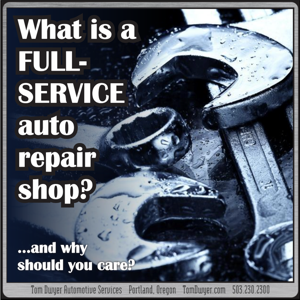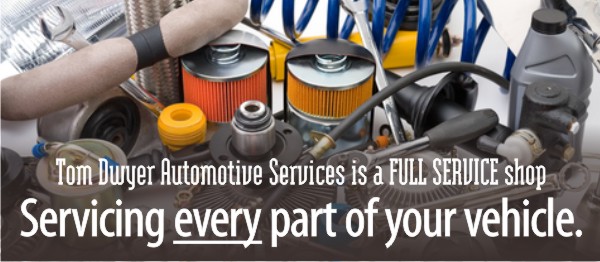 How are Full-Service Shops different from Specialty Shops, and why should you care?
How are Full-Service Shops different from Specialty Shops, and why should you care?
If you look around today’s auto care world you’ll see a lot of ‘specialty shops’, or auto service businesses that specialize in one small arena of auto repair and maintenance. Perhaps the most well-known are the “Quick Lube” places that specialize in oil changes, but there are others… maybe it’s a tire place, or a brake place, or a muffler shop. It’s not unreasonable to think these places would be specialists in the areas they serve so they might give you better service than the one-stop shop on the corner. Sometimes, you may even be right! But not usually, not for comprehensive vehicle care. We’d like to explain the difference between ‘Full-Service’ and ‘Specialty’, and why we think you’re almost always better served by a FULL-SERVICE mechanical shop.
What is a Full Service shop?
A Full Service shop, as the name implies, offers all the major and minor repair and maintenance services your vehicle is likely to need, no matter the manufacturer. This covers everything from light bulbs and oil changes all the way to major things like engine and transmission replacement. NO SHOP can do ABSOLUTELY everything, but a full-service shop should be ready to do just about anything a normal driver will encounter. Almost as important, they’ll know when (and who!) to call when a job is too big even for them.
Why should I care?
There are two basic approaches to auto ownership. The first is the “drive it till the wheels fall off” plan that most people follow (and is our default plan here at Tom Dwyer). The idea is to maximize the safe, usable, reliable lifetime of your vehicle, then sell it when the expenses of keeping it going get too great. This requires a proactive approach of seeing your vehicle AS A WHOLE, not part-by-part. It requires staying up on all maintenance (of course), but also monitoring the vehicle over time, tracking small problems from the moment they start, and fixing them before they cause major and expensive damage. A Full-Service shop is ideal for this type of vehicle ownership.
The other path is the “use it up and sell it” approach, where owners do the minimum basic maintenance, fix things as they break, then sell the vehicle soon after the warranty is up. Specialty shops fit this plan much better than Full-Service shops. If the long term viability of your vehicle is not your priority, then fix-on-fail service from Specialty shops makes perfect sense.
A specialty shop CAN’T provide full automotive care. If a shop deals with just one subsystem of your vehicle then that’s what they look at. They don’t ‘see’ the other parts. For example, a tire place might sell a new suspension without ever noticing the metal shavings in your oil indicating your engine is about to die. You might not have bought that expensive suspension if you knew about the $7000 engine repair about to total your car but it’s not the tire place’s fault… you didn’t pay them to monitor it, much less check it, and certainly not to tell you about it.
What kinds of Specialty shops are there?
There are many kinds of specialty shops, but for the purposes of this article we’ll break them down into two kinds.
Sub-Specialty Shops– These shops deal with one of several major subsystems of your vehicle. They’re the “Quick Lube” places, tire places, brake places, muffler shops, and more. THEY AREN’T ALL BAD and they can even play a valuable role in your auto ownership, especially if you’re on the ‘use-it-up’ plan! But, IN GENERAL, we recommend you try to avoid them because of their business model. These shops are invariably commission-based so the staff only gets paid if they sell you something, and the only things they can sell are the products they have in the store… whether you need them or not. Sub-Specialty shops are where you’ll face the hardest upsells for the softest reasons. A Quick Lube will sell you a cabin air filter and a Full-Service shop will too, but the Full-Service place is much more likely to wait until its actually needed because they’re looking at the overall vehicle for the long term, not the possibility of a bigger one-time sale.
Other shops specialize for a variety of legitimate reasons, and they play a huge role in every aspect of the automotive industry. A Full-Service shop should be ready and willing to call any of these professionals to supplement their own services…
- Brand specialty shops tailor services to individual auto brands because of manufacturer-specific quirks or necessary software and tools to service their vehicles. Dealerships obviously do this, but some independent shops specialize as well. You’ll see lots of specialists on European vehicles (Saab, Volvo, VW), fewer on Asian or American manufacturers (Toyota, Chevrolet)
- Body Shops (Collision repair)- Most drivers will have a fender bender in their driving lives, but the expertise (and equipment) to straighten a frame or do a precise paint job don’t usually overlap with a mechanical shop. Though there are a few shops that do both, the auto industry sensibly splits along these lines. In a serious accident you’ll probably still need mechanical repair as well so a collision shop will likely send you back to a general repair shop when they’re finished.
- Niche shops cater to folks who want their vehicles to do one specific thing very, very well. They’ll have specialized equipment or access to specialized parts that regular shops won’t carry. Off-roading shops, RV shops, speed shops, or classic car shops are just a few of the kinds on offer. If you have something other than a consumer-grade daily driver you may be well served by one of these.
- Technical specialties– A Full-Service shop should be able to replace a faulty engine or transmission but rebuilding them is something outside the range of even the best Full-Service shop. Technical shops have equipment, experience, and expertise in these narrow fields a general shop can’t match. For example, a muffler shop depends on gifted welders who can do flawless welds on difficult or inaccessible areas, but these specialists probably can’t be justified by the workflow of a general shop. Technical shops usually don’t work with the general public, instead dealing with shops on a business-to-business basis and serving multiple auto shops from Dealers to independents. Metal machining, electrical diagnosis, and leak detection are just a few of the many technical specialties you may need one day.
Get the service you need, wherever it comes from
We’re obviously a little biased about Full-Service shops, but the most important thing in your driving life is YOU. Get the service you need, when you need it, wherever you can get it. For example, we often tell clients “some oil is better than no oil at all”. If you’re running dry on oil and your Full-Service shop can’t get you in, don’t hesitate to stop at the corner Quick Lube for their oil change special… just don’t buy anything else, make sure your oil drain plug is put back in, and go back to your regular Full-Service mechanic as soon as you can.











